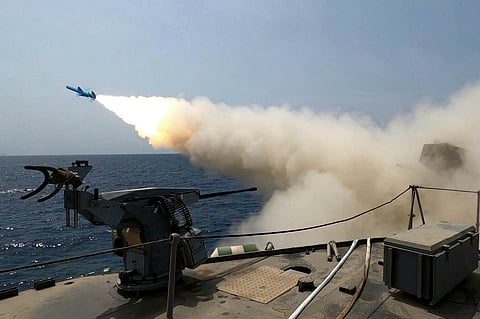Iran's navy launches country's first military drill since 12-day war with Israel
'Sustainable Power 1404' exercise comes as Iran is trying to project strength after war

TEHRAN: Iran launched its first military exercise since the end of its 12-day war with Israel, state television reported on Thursday, with navy vessels launching missiles at targets at sea in the Gulf of Oman and the Indian Ocean.
While such drills are routine in the Islamic Republic, the “Sustainable Power 1404" exercise comes as authorities in Iran are trying to project strength in the wake of a war that saw Israel destroy air defence systems and bomb nuclear facilities and other sites.
The state TV report said the frigate IRIS Sabalan and a smaller vessel, the IRIS Ganaveh, launched Nasir and Qadir cruise missiles at targets in the sea, striking them. Coastal batteries also opened fire as part of the exercise.
Iran's navy, estimated to have some 18,000 personnel, apparently avoided any major attack during the June war.
The navy, based out of the port city of Bandar Abbas, patrols the Gulf of Oman, the Indian Ocean and the Caspian Sea, and broadly leaves the Arabian Gulf and its narrow mouth, the Strait of Hormuz, to Iran's paramilitary Revolutionary Guard.
The Guard's naval forces are known for seizures of Western vessels during the breakdown of Iran's 2015 nuclear deal with world powers, as well as closely shadowing passing US Navy vessels coming into the region.
Since the end of the war, Iran has increasingly insisted that it is ready to counter any future Israeli attack.
New missiles
Defence Minister Brig. Gen. Aziz Nasirzadeh said that the country has equipped its forces with new missile, in remarks reported Wednesday by the state-run IRNA news agency. "In response to any potential enemy adventurism, our forces are prepared to use these new missiles effectively.”
Meanwhile, Iran has suspended its cooperation with the International Atomic Energy Agency, which has been monitoring its nuclear sites as Tehran enriched uranium to near weapons-grade levels amid the tensions.
France, Germany and the United Kingdom, the European parties to Iran's nuclear deal, have warned that if Tehran doesn't reach a “satisfactory solution” to its dispute with the IAEA by August 31, they will trigger a “snapback” reimposition of all United Nations sanctions on it previously lifted by the accord.
While already stung by American sanctions since 2018, analysts warn that renewed UN sanctions could further weaken the country's ailing economy.



